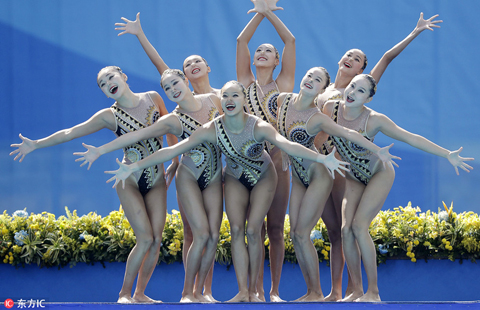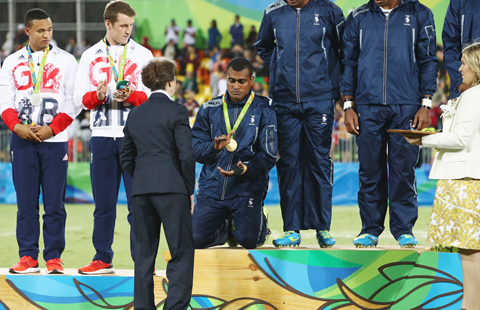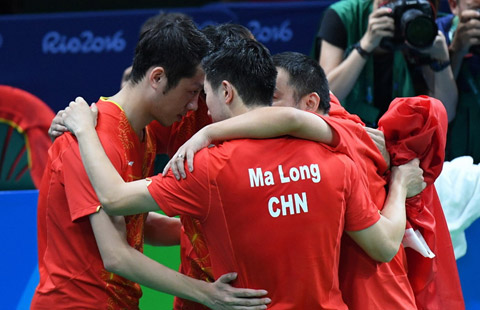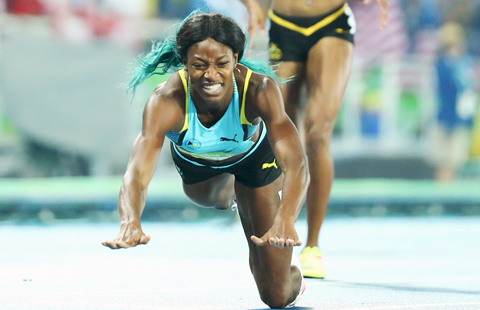Social media reshaping fans' access
By SUN XIAOCHEN (China Daily) Updated: 2016-08-20 08:09
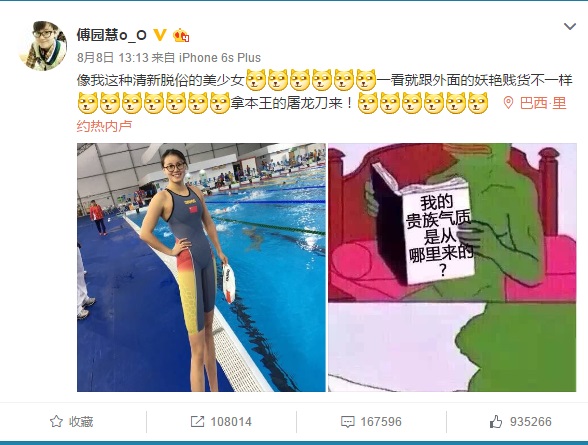 |
|
A screen shot of Fu Yuanhui's post on her Sina Weibo, a Twitter-like social media platform. Fu is a Chinese bronze medalist of backstroke swimming at Rio Olympics, whose interview with China Central TV went viral online after the competition. [Photo from Sina Weibo] |
Social media have reshaped the way fans stay connected to stars and action at the Olympics by providing intimacy and immediacy like never before.
As global media battle for updates about star athletes at the Rio Olympics, their readers and viewers are touching base in real time with athletes on the likes of Twitter, Instagram and Sina Weibo.
Athletes have embraced social media by chatting with followers and posting photos anytime, anywhere. This has created direct access for sports fans, catering to their growing appetite for behind-the-scenes glimpses and close interaction with their idols.
A video clip posted by US basketball player DeMar DeRozan on Instagram, which showed teammates Jimmy Butler and Kyrie Irving singing along to Vanessa Carlton's 2002 hit A Thousand Miles on their flight to Rio, was among content on social media that has been viewed at least 1 million times in the past two weeks.
DeMarcus Cousins, the US basketball team's center, said that social media help expose athletes' off-court look, intriguing fans in a compelling way.
"I can understand why people want to see that side of us. Usually we're straightforward about business. ... You never get to see that relaxed side. It's just rare that you get to see it," said the Sacramento Kings All-Star.
Young athletes nowadays are prone to being followed continuously on social media to stay in the spotlight, said Zheng Saisai, a 22-year-old Chinese tennis player.
"It's rare that an athlete doesn't post using a smartphone on their Twitter or weibo accounts," she said. "To see the instant reaction from fans about the latest post is fun, which makes you feel like, 'Oh, I am a celebrity now'."
Zheng, who just finished her first Olympic tournament in Rio, has taken a step forward by live-streaming her stay in the Olympic Village, as well as her pre-match practice and other events, through apps on her smartphone.
Her post-match streaming, after defeating Polish world No 5 Agnieszka Radwanska in the women's singles first round on Aug 6, attracted up to 80,000 views within 30 minutes.
The rapid and contagious communication on social media has made it possible to generate stars by elevating their profiles overnight, said Hong Jianping, a sports communication researcher at Beijing Sport University.
The social media rise from obscurity to stardom of Chinese female swimmer Fu Yuanhui after her hilarious performance in a poolside interview serves as an example.
The bronze medalist's remarks, such as use of "prehistoric powers", coupled with her exaggerated facial expressions, went viral online.
The number of followers on her Weibo account increased from fewer than 50,000 before the Olympics to more than 6.5 million currently, making her the most-followed star of China's Rio delegation.
Still, that was dwarfed by the social media popularity of Real Madrid soccer star Cristiano Ronaldo, who became the first athlete worldwide to reach 200 million followers total on Twitter, Instagram and Facebook.
The Portuguese striker opened a micro blog account in May, and since then he has constantly posted personal photos with sponsor logos.
"In addition to their genuine wish to stay close to fans, sports stars are using their exposure and following on social media for commercial purposes," said Hong, the researcher.

